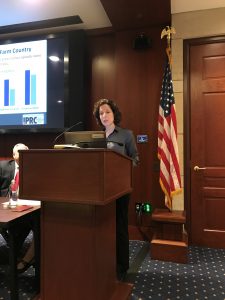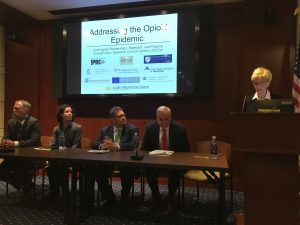On February 27, more than 100 state legislators and staff gathered for a congressional briefing in DC to learn how a network of 10 Injury Control Research Centers (ICRCS) are tackling the nation’s deadliest drug epidemic.
The briefing, Addressing the Opioid Epidemic: Leveraging Partnerships, Research and Practice, was co-hosted by CDC-funded ICRCs and Representatives John Moolenaar (R-MI) and Debbie Dingell (D-MI) from Michigan.

“It was a united gathering of ICRCs around a specific topic,” said UI IPRC Director Corinne Peek-Asa. “Prevention is key. I’ve heard it this way: We can’t treat or arrest our way out of the opioid problem.”
IPRC Associate Director Carri Casteel participated in the briefing’s 4-person panel, focusing on the challenges in rural America, where around 46 million people face health disparities including adverse outcomes from opioids. More and more, opioids are impacting occupations like farming, she said.
“Drug overdose death rates started as an urban problem but switched to a rural problem over time,” Casteel said.
The event also covered how ICRCs are collaborating with law enforcement to develop surveillance systems to capture nonfatal outcomes of opioid use (Michigan) and working to understand the impact of opioids on U.S. Veterans (West Virginia).
ICRCs are the research wing of the injury field. However, ICRCs are charged with more than just working the data: They work with law enforcement, health delivery systems, state and local health departments and other stakeholders to develop and implement effective strategies to address injuries like opioid overdoses.
Peek-Asa said, “Longstanding partnerships are needed to have long-term impact on not only opioids, but other critical issues like distracted driving and traumatic brain injuries.”
Last year, the UI IPRC participated in a network of four ICRCs to reach policymakers about how to address the opioid burden in their states. The UI IPRC, led by Casteel, brought 38 stakeholders together across Iowa to discuss priorities for addressing the prescription opioid crisis in the state. The resulting report was presented to a state legislative committee tasked to make recommendations about opioids to Iowa Governor Kim Reynolds.

Peek-Asa said opioid overdoses, as well as other types of injuries, are not just accidents, and can be both predictable and preventable.
“You can compare injuries to other health events, like infectious disease. If we understand how injuries happen, then we can interfere along the causal pathway at different points with an intervention,” she said. “Think about what air bags and bicycle helmets and child safety seats have done reduce injuries and save lives.”
The message of ICRCs: We can do the same for opioids.
Read a summary of UI IPRC’s opioid work in Iowa.
Published 3/2018